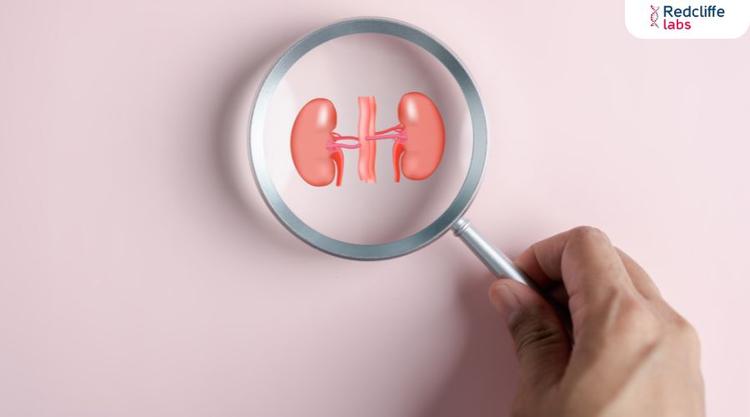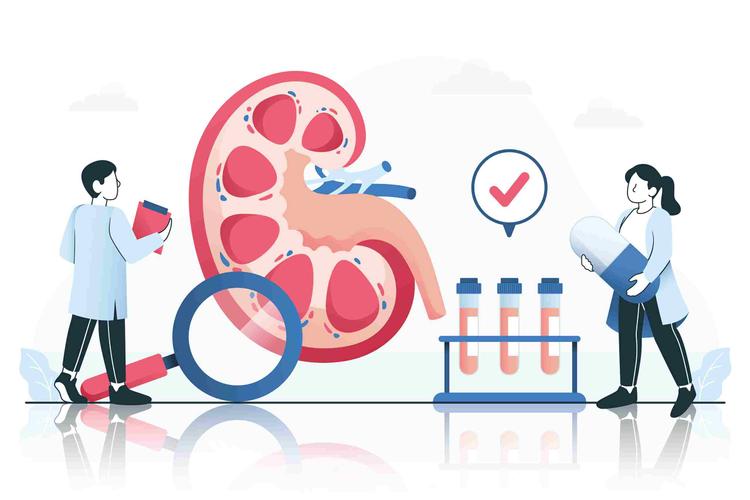Is Creatinine Level 1.7 Dangerous?

Medically Reviewed By
Dr. Geetanjali Gupta
Written By Muskan Taneja
on Oct 26, 2024
Last Edit Made By Muskan Taneja
on Jul 19, 2025

Creatinine is a waste produced because of indigestion and muscle breakdown. Your kidney filters out creatinine from the blood and flushes it out from the body through urine. Doctors usually conduct the creatinine test to measure the creatinine levels in the blood or urine.
Both men and women have different creatinine levels in the body. Age and gender are two important factors for determining creatinine levels. A high creatinine is a sign of kidney disease, kidney failure, or any other underlying health condition.
You might ask yourself, ‘Is creatinine level 1.7 dangerous?’ but you should know about the normal level first. Doctors say a creatine level of 1.7 mg/dL is a mild high in the normal range, which might indicate 50% normal kidney function.
Understanding Creatinine and Its Level
Creatinine is produced during the breakdown of creatine phosphate. Creatine phosphate is a chemical that provides energy to your muscles for overall effective functioning.
The kidney forms constantly and then releases creatinine from the blood for urinal exertion. The creatinine level in the blood represents the balance between its production and elimination.
Elevated creatinine indicates that the kidneys cannot eliminate excessive creatinine, which may cause impaired kidney function.
What is the Normal Range of Creatinine Level?
Creatinine level differs in both males and females. The normal range of creatinine levels in men is 0.6 to 1.2 mg/dL; in women, it's 0.5 to 1.1 mg/dL.
These ranges may differ because of:
- Age
- Gender
- Muscle mass
- Medical history
- Person’s health
Is Creatinine Level 1.7 Dangerous?
Normal creatinine levels generally range from 0.5 to 1.2 mg/dl. Any reading higher than this indicates elevated creatinine, which can be a warning sign of a potential health issue.
If your creatinine level exceeds 1.7 mg/dl, it signals that kidney function may be compromised.
Though various factors can contribute to elevated creatinine, seeking medical advice promptly is crucial. Left untreated, high creatinine levels can result in serious health complications, including kidney damage and, ultimately, kidney failure.
This happens because of the accumulation of waste and toxins in the blood, which the kidneys can no longer filter out efficiently. Over time, this can lead to reduced kidney function. If treatment is not promptly administered, it may lead to irreversible kidney damage, potentially necessitating dialysis or a kidney transplant.
Apart from kidney-related issues, elevated creatinine can also trigger other health concerns, such as anemia, high blood pressure, and bone disorders.
Anemia, marked by decreased red blood cells, can cause symptoms like fatigue, shortness of breath, and weakness. High blood pressure, on the other hand, can harm blood vessels and heighten the risk of heart disease and stroke. Bone disorders can arise when there’s an imbalance in calcium and phosphorus levels, leading to bone weakening and loss of density.
Addressing high creatinine levels early is vital to avoiding these complications and preserving kidney function and overall health.
20 Symptoms of High Creatinine Levels
A person can have high creatinine levels because of reasons such as drug toxicity, kidney infection, glomerulonephritis, diabetes, high blood pressure, heart diseases, kidney failure, and urinary tract blockage.
Here are 20 symptoms of high creatinine levels.
- Shortness of breath
- Nausea and vomiting
- Confusion
- Irregular heart rate
- Weakness or fatigued
- Pain in chest, back, side, or groin
- Fever
- Frequent urination
- Cloudy, dark, foul-smelling, or bloody urine
- High blood pressure
- Decreased urine output
- Swelling in the ankles or face
- Slow-healing wounds
- Numbness or tingling in hands or feet
- Blurry vision
- Loss of appetite
- Difficulty in sleeping
- Irregular heartbeat
- Itching
- Muscle cramps
4 Causes of High Creatinine Levels
Maintaining creatinine levels in the blood or urine is important to prevent kidney complications. There are multiple causes of high creatinine levels.
Excessive Physical Activity
Excessive workout or physical activity can increase creatinine levels in the blood.
Lifestyle
Diet and lifestyle can affect your body’s waste management function. A healthy diet can maintain creatinine levels and decrease risks of high creatinine levels.
Infection
Infection, especially kidney infection, can increase creatinine levels. If you have any, make sure to inform your doctor prior.
Medications
Anti-inflammatory drugs or medications can increase creatine levels. If you have inflammation or swelling, consult your doctor before taking any medications.
Risks and Complications Of High Creatinine Levels
A high creatinine level can cause multiple risks and complications. These include:
- Cardiovascular Diseases
- Kidney Failure or Infection
- Kidney Blockage
- Autoimmune Conditions
- Urinary Tract Issues
- Diabetic Kidney Disease
How To Measure Creatinine Levels?
A doctor can prescribe a blood test to measure the creatine level. It is the most reliable and recommended test that can determine creatinine clearance. The test measures kidney function.
The creatinine test estimates the glomerular filtration rate (GFR), which locates the kidney functioning to filter out waste from the blood.
Redcliffe Labs offers a creatinine test at INR 140 in PAN India. They believe in providing quality diagnostic service to every Indian. Redcliffe Labs provides a home sample collection service, making diagnostic services accessible and affordable for everyone.
How To Manage Creatinine Levels?
You can manage creatinine levels in several ways.
- Keep yourself hydrated by drinking enough fluids throughout the day.
- Take a healthy diet rich in fruits, vegetables, whole grains, and essential nutrients.
- Practice regular exercise to maintain your overall weight and reduce the risks of CVDs or kidney failure.
- Protein is essential for kidney function, so add enough protein to your diet.
- High blood pressure can increase kidney damage, so take a low-sodium diet.
- To manage your overall health, practice stress management techniques like yoga and meditation.
Key Takeaways
People often say creatinine level 1.7 is dangerous. However, this range is not considerably dangerous. Monitoring symptoms and causes and evaluating creatinine levels can help prevent risks of high creatinine levels. Redcliffe Labs understands the importance of creatine levels, which can prevent kidney damage or failure. Book the creatinine test from our website and take preventive measures for your kidney health today.
Leave a comment
5 Comments
Krishna Rai
Jun 25, 2025 at 10:47 AM.
Creatinine level has gone up to 1.7
Myhealth Team
Jun 27, 2025 at 5:51 AM.
A creatinine level of 1.7 is above normal and may suggest reduced kidney function or dehydration. Please consult your doctor soon to check the cause and get proper treatment.
Sanjay unde
May 12, 2025 at 10:36 AM.
My creatine level is 1.12 umar 36sal is normal
Myhealth Team
May 13, 2025 at 11:18 AM.
आपकी उम्र 36 साल है और क्रिएटिनिन लेवल 1.12 mg/dL है, जो सामान्य सीमा (0.7–1.3 mg/dL) में आता है। अगर कोई लक्षण नहीं हैं और लेवल स्थिर है, तो चिंता की जरूरत नहीं। पर्याप्त पानी पिएं और प्रोटीन का संतुलन बनाए रखें। अगर लेवल बढ़ता है या अन्य लक्षण हों, तो डॉक्टर से जांच कराएं।
Mae ann Dubal
Apr 10, 2025 at 10:51 AM.
My creatine 1.7 this dangerous at the of 54
Myhealth Team
Apr 23, 2025 at 10:04 AM.
A creatinine level of 1.7 mg/dL is higher than the normal range (typically 0.6 to 1.2 mg/dL). While it’s not immediately dangerous, it may indicate some level of kidney stress or dysfunction, especially at the age of 54. It’s important to consult your doctor for further evaluation to identify the cause and take any necessary steps to protect your kidney health.
Chandrakant Doshi
Mar 12, 2025 at 4:57 PM.
My creatinine report 1.4 mg Please help me what i do it's bad ? I am 71 years old man,
Myhealth Team
Mar 12, 2025 at 5:35 PM.
A creatinine level of 1.4 mg/dL is slightly elevated for a 71-year-old man, but it's not necessarily alarming. Mild increases can be due to age-related decline in kidney function, dehydration, or high protein intake. Stay hydrated, limit salt and protein, and avoid over-the-counter painkillers like NSAIDs. Regularly monitor kidney function and consult a doctor for a detailed evaluation.
Ranganath
Feb 8, 2025 at 10:25 AM.
How can I reduce the creatine level 1.4 it's up and down some times 1.5 what's the proper diet
Myhealth Team
Feb 11, 2025 at 1:05 PM.
To lower creatinine levels (1.4-1.5) in an Indian diet, drink plenty of water, limit protein (avoid non-veg, paneer, and dairy), and reduce salt. Opt for kidney-friendly foods like bottle gourd (lauki), ridge gourd (turai), apple, papaya, moong dal, and rice. Avoid processed foods, pickles, and high-potassium items like bananas and potatoes. Use herbs like coriander and cumin for flavor. Consult a doctor for personalized advice.


